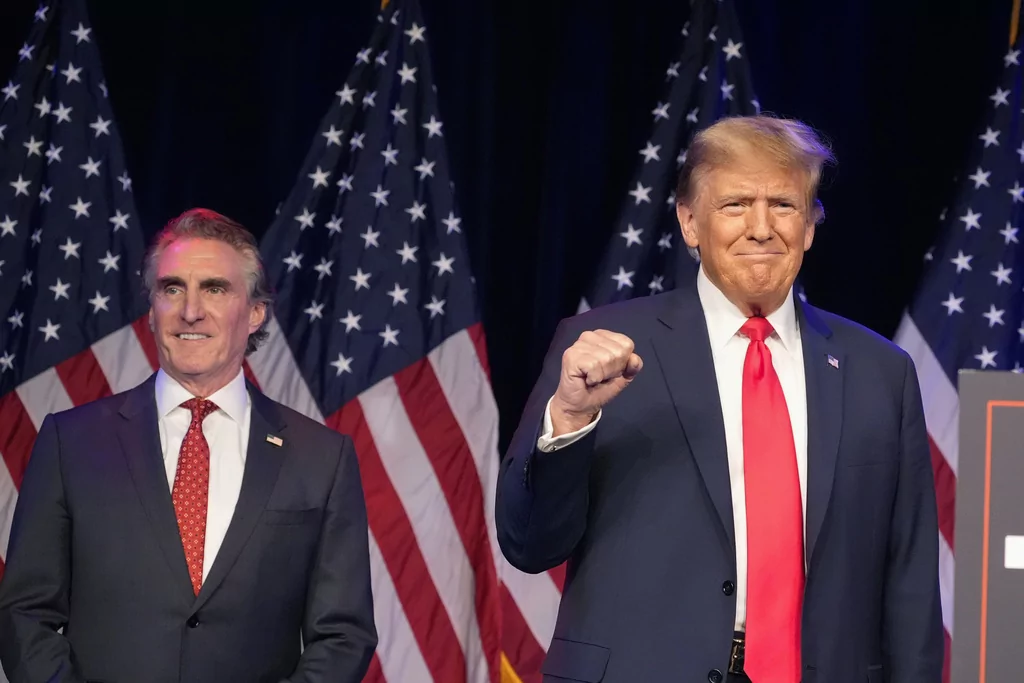

While the world waits for the other shoe to drop with President Joe Biden, former President Donald Trump has a momentous decision to make of his own: his 2024 running mate.
Trump has had a lot to say in public about his prospects, but he has yet to identify his pick. He has repeatedly said he would like to make the announcement as close as possible to the Republican National Convention, which starts on Monday in Milwaukee. There are reports that he might roll out his choice Apprentice style.
The short list is widely believed to have shrunk to three people: Sens. J.D. Vance (R-OH) and Marco Rubio (R-FL) and Gov. Doug Burgum (R-ND). Trump mentioned all three of them earlier this week in a radio interview with Brian Kilmeade, weighing their pros and cons.
“Vance is probably where his heart is, Rubio his head, and the smart money is on Burgum,” a senior Republican told the Washington Examiner while conceding that “nobody really knows anything for sure.”
MEET THE EIGHT TOP NAMES ON TRUMP’S VP SHORT LIST
Trump is a mercurial candidate who loves surprises and tweaking the press, so nothing can be taken as a given. He waffled on his last selection until practically the last minute.
Vance, who before being elected to the Senate was the author of the acclaimed book Hillbilly Elegy, would represent a doubling down on working-class voters and the Rust Belt states Trump won in 2016 but lost in 2020. The Biden campaign told nervous Democrats on Thursday that Pennsylvania, Michigan, and Wisconsin remain their best path to a majority of electoral votes.
The freshman Republican senator is an effective communicator. He is also more committed to a more populist and nationalist version of conservatism than Trump himself, on both foreign policy and economics. He has collaborated with Democrats in the Senate on legislation, including Sen. Sherrod Brown (D-OH), his state’s senior senator who Republicans are trying to unseat this November.
All of these things are viewed as pros by elements of Trump’s MAGA base, who would like to see the former president repeat his winning formula from 2016 and perhaps govern more in line with that branding in a second term. But other factions of the GOP view these attributes as negatives, signifying that Vance doesn’t hail from a different wing of the party than Trump and doesn’t add anyone to the coalition the presumptive presidential nominee couldn’t win on his own.
These Republican critics often point out that Vance ran behind other candidates on the 2022 Ohio GOP ticket as well as both of Trump’s previous presidential performances and required a substantial infusion of cash, some of it from the Republican establishment, to win his race. But it is also true that Vance’s Democratic opponent, former Rep. Tim Ryan, an erstwhile aide to the eccentric populist former Rep. Jim Traficant, fought to win a similar constituency.
There is also a risk that the media will be more hostile to Vance than other prospective VP candidates, including the conservative outlets that have tended to oppose Trump. But that hasn’t proven decisive against the top of the ticket, so it may not matter.
Some observers consider Donald Trump Jr., a Vance friend and ally, speaking ahead of the vice presidential nominee at the Republican convention to be a positive sign for the Ohioan.
Like Vance, Rubio did not start on good terms with Trump. Endorsed by Nikki Haley in 2016, “Little Marco” was the choice of many anti-Trump Republicans in that year’s primaries. But Rubio, who warmed up to Trump, has shifted in a more populist direction on economic policy and hired staffers who reflect that commitment.
But lingering questions remain on immigration (Rubio was a booster of the 2013 Gang of Eight proposal that seriously handicapped his campaign for president three years later) and foreign policy (he has a more interventionist history). Trump Jr. has worried that Rubio is too establishment friendly.
At the same time, Rubio could conceivably be MAGA friendly enough while also retaining some support from Haley voters who have been reluctant to come around to Trump. His appeal to Hispanic voters is also a consideration.
Yet the biggest problem might be technical: Florida’s electors cannot cast votes for two candidates from their state. Trump will likely need Florida’s 30 electoral votes and may be reluctant to switch his primary residency back to New York given the high taxes and legal troubles for both himself and his business.
“You do that and it makes it more complicated. There are people that don’t have that complication. Now it’s fairly easily fixed, but you have to do something with delegates or there has to be a resignation,” Trump told Fox News Radio. “So it’s not like picking some people where it’s very easy, where there is none of that.”
Burgum might be the most similar to former Vice President Mike Pence. He looks like someone who could play a president or vice president on TV but won’t upstage the boss. The last time Trump had to make this choice, he picked someone calmer and more conventional than he was.
The North Dakotan wouldn’t have the same draw with evangelicals that Pence had, but he might with Trump-wary GOP donors. Spencer Zwick, for example, was an adviser and finance chairman for Mitt Romney, a business partner of one of Romney’s sons, and a Haley 2024 finance team member. Burgum would reportedly get him on board the Trump train.
Trump has said he is worried about the strict abortion ban in place in North Dakota. It is also possible that the similarities to Pence are less attractive to him after breaking with his former vice president in the aftermath of the 2020 election. Pence will not endorse Trump for president this year and has stepped up the criticism of his former boss’s conduct on Jan. 6.
At 67, Burgum is also older than Rubio, 53, and Vance, 39. This could be a factor in a race increasingly defined by the 81-year-old incumbent’s age. Trump turned 78 last month.
CLICK HERE TO READ MORE FROM THE WASHINGTON EXAMINER
It’s possible that none of these three will be Trump’s VP selection and he will name someone else entirely. Sen. Tim Scott (R-SC) may still be in contention. Tightening polls in New York could pave the way for Rep. Elise Stefanik (R-NY). Haley, once Trump’s U.N. ambassador, or Gov. Ron DeSantis (R-FL) could be unifying after the primaries. Gov. Glenn Youngkin (R-VA) is another potential dark horse.
The wait will soon be over.




